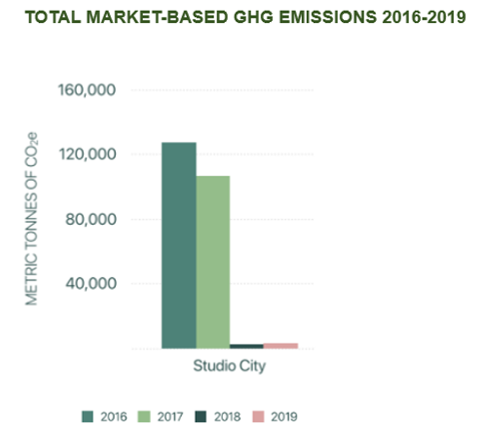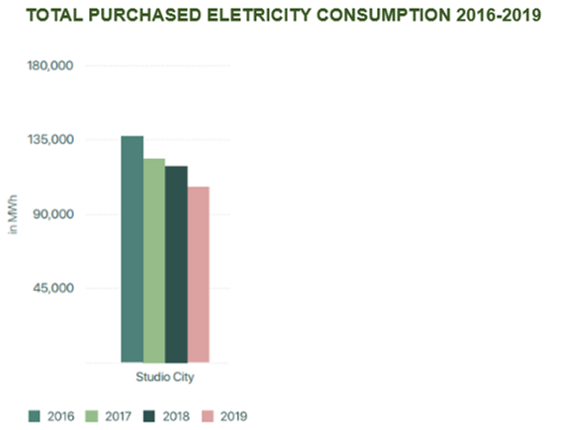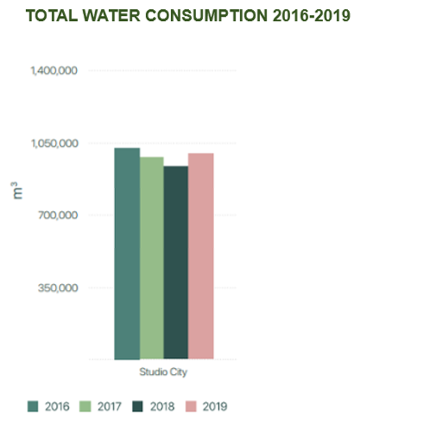Environment
Our environmental strategies are inextricably linked as a system – there is no silver bullet. We aim to support the growing constellation of efforts to protect our ecosystems, move towards clean energy, eliminate waste and in the process, help alleviate some of the world’s health problems.
A Sustainable Future: The Only Future
Applying the full spectrum of our unique assets for positive impact requires not only significant investment, but also passion. We are laser-focused on delivering sustainable returns by harnessing the resourcefulness of our people to create innovative luxury experiences that also safeguard our environment. Studio City sees no other option but to lead and inspire others by showing them that a sustainable future is the only future.
We have set ourselves ambitious environmental goals to achieve by 2030, and it is these goals that are pushing us to challenge ourselves and the industry to not only be creative, but fastidious in tackling the most phenomenal challenges of our time:
- Operating as a carbon neutral resort
- Achieving 20% improvement in energy performance for all new developments
- Achieving zero waste across our resort and contributing to the circular economy in Asia
- Extending our positive impact by sourcing sustainable goods and services
Carbon Neutral Resorts
To radically decarbonize our systems and resort to meet the ambitious target of becoming carbon neutral by 2030, we must relentlessly seek out the latest technologies, low-carbon materials and energy-efficiency measures to reduce our carbon footprint. These include:
- Prioritizing investment in renewable energy by installing renewable energy systems onsite
- Adopting efficiency measures to reduce overall energy consumption at our resort
- Phasing in electric vehicles across resorts where the infrastructure exists, starting with shuttle buses, with a longer-term goal for all our vehicles to be fully powered by renewable energy where possible. Increasing the number of charging bays for electric vehicles for guests and colleagues to use in our resort
- Purchasing electricity from renewable sources in Macau through Energy Attribute Certificates (EACs), other renewable energy instruments or verified carbon credits, equivalent to the quantity of GHG emissions arising from electricity consumed by us
Climate Resilience
At the heart of our bold commitment to operate as a carbon neutral resort is our responsibility to do what we can to address our climate emergency. The onslaught of extreme weather incidents in recent years has clearly demonstrated to us how climate change is affecting every corner of the world and that proactive measures are warranted.
We are aware that in addition to minimizing our impact on the climate, increasing our ability to withstand the adverse effects of climate change is also equally important. As part of our sustainable sourcing strategy, we are engaging with our suppliers to enhance the resilience of our supply chains. Recognizing that our resort is also at risk, we ensure that it is built to withstand climatic threats such as storms, flooding and sea-level rise, as well as extreme temperature.
Studio City Phase 2 has been designed to withstand typhoons, extreme wind as well as flooding and sea-level rise. To withstand wind force based on the worst-case scenario happening once in 200 years, the Macau regulatory requirement for structural building design was followed, which is much more stringent than the Hong Kong standard. Higher standards were also adopted for the allowable building drift, which means the building is designed to move horizontally with reduced development of cracks, improving its structural integrity. Computational fluid dynamic and climatic modelling, using the highest wind speeds and pressure endured over the past ten years, was also applied to ensure that the building could remain resilient with the split-tower design allowing for sufficient ventilation and enhanced air circulation. Furthermore, flooding analysis was carried out in the design stage of the project, leading to the building being ready for the worst-case scenario rainfall and flooding happening once in 200 years
Sustainable Buildings
The foundation of our ambitious goals is to make our buildings sustainable. We seek to design new or retrofit existing buildings for enhanced performance from every possible angle – ensuring we consider how all elements of a building work together to meet our business needs, our guests’ experience, the environment and evolving climate risks.
Studio City Phase 2 is designed to support both our carbon neutral and zero waste goals. We are committed to achieving the highest standard of sustainability applicable in the local industry, setting a target for this project to achieve the Green Building Design Label (GBDL) and “Excellent” rating of the BREEAM certification. Upon completion, Studio City Phase 2 will have the potential to become the first BREEAM-certified hotel in the South China region.
The sustainability strategy for Studio City included extensive planning to engineer the two hotel tower blocks to be precisely distanced from each other so as to create an adequate ‘sky-stream’ to facilitate bird migratory pathways. Beyond ensuring that the development was located away from the existing Macau Cotai Ecological Zone, comprising 15 hectares of protected wetland claimed as a resting place by many species of migratory birds, strategies also included minimizing the impact of basement excavation on both the wetland and underground water sources. An ecologist was specifically engaged to develop preservation measures for existing flora and compensatory planting with species compatible with the site’s landscape and habitat.
The development also follows the sustainable procurement plan, which ensures that all selected contractors use timber and timber-based products that are legally harvested, traded and sourced in accordance with Forestry Stewardship Council™ (FSC™) certification, as well as paints, coatings, sealants and adhesives that have no or low-VOC content where possible.
Reducing Greenhouse Gas (GHG) Emissions
Based on our headline performance in 2019, we are in the early stages of realizing the benefits of the investments and actions we have taken and planned to move us towards meeting our 2030 target.

Energy-efficiency Measures
As we head towards an energy-efficient and sustainable future, the onus is on us to use energy more responsibly. With environmental and climate-related benefits, as well as cost savings from reduced consumption, integrating energy-efficiency measures across our operations, simply makes sense. Here are some of our highlights from 2019:
- We implemented delamping in multiple locations, adjusted kitchen ventilation flow rates and replaced its secondary chilled-water pump impeller
- We were once again named Champion of the Hotel Group B category at the Macau Energy Saving Activity 2019 organized by Companhia de Electricidade de Macau (CEM) and the Office for the Development of Energy Sector of Macau SAR, and were awarded the Continuous Energy Saving Award (Hotel Group) for the third consecutive year. The awards recognize our continuous efforts in promoting energy efficiency and conservation.

Transitioning to Renewable Energy
The sheer magnitude of today’s global challenges requires sizeable investment from the private sector. Through accelerating the adoption of renewable energy in our own resort, we strongly believe we will set the bar and mobilize the scale of change that is needed now to make a clean future possible. We are investing into the following initiatives to accelerate our transition to renewable energy:
- Onsite solar photovoltaic (PV) energy generation and consumption
- Purchase of Energy Attribute Certificates (EACs) for 100% of our global electricity consumption
- Expansion of electric vehicle fleets
Reducing and Recovering Food Waste
Food wastage exacerbates global food security risk and already strained natural resources and ecosystems. With one-third of the world’s food never making it from farm or factory to fork, food waste is a global challenge that requires urgent attention to reduce both GHG emissions and the unnecessary use of resources, and conserve ecosystems.
With more than 20 restaurants, cafés and bars across our resort, we are focused on reducing food waste, while inspiring others to up their game. To reduce food waste at source, in 2019, we explored opportunities for leaner food production and improved demand forecasting in our production and commissary kitchens. Since September 2020, we have been trialing Winnow AI technology to tackle food waste and operate more sustainable kitchens. Being the most advanced food waste measurement technology on the market, this initiative will allow us to maximize operational efficiency and data accuracy, with the ability to reduce food waste by up to 50% by value.
Onsite dewatering and composting facilities are an integral part of the kitchen design for Studio City Phase 2. When operational, we aim to manage 100% of the food waste from all our kitchens and F&B outlets onsite.
Reusing and Recycling
Whatever waste we fall short of eliminating or reducing, we strive to reuse and recycle it to close the loop and move towards a Circular Economy.
At Studio City Phase 2, dedicated areas for the collection and storage of recyclable materials are being incorporated into building designs to ensure we maximize the sorting and recovery of materials. Our principal contractor is required to implement a construction and waste management plan that facilitates the reuse, recycling and recovery of materials throughout the construction phase.
Water Use and Reuse
Water is a precious resource that we are committed to using responsibly. We conserve water in the first place and reuse water in our resort’s water cycle wherever we can. Some key initiatives we have in place to conserve water include:
- We have automatic sensors on all faucets and water-saving toilets and showers in hotel guest rooms
- We have a rainwater recovery system that stores rainwater for onsite irrigation
- Extensive planting minimizes water loss through wind evaporation from pools and river features
- At Studio City Phase 2, a leak detection system exposes water leaks within the building and between the building and utilities’ water meters, enabling us to prevent water wastage
- Training our colleagues to be vigilant in their water usage while cleaning guest rooms and public areas also makes a big difference

